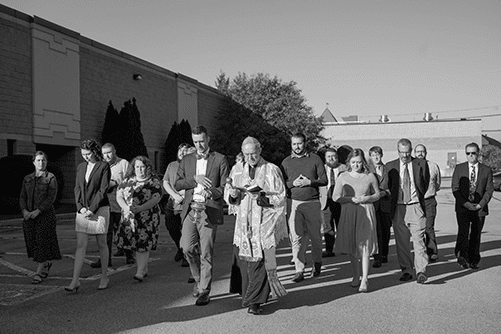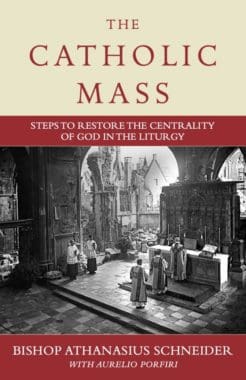The Mass Is Adoration
The Latin term adoratio originally meant a gesture of reverence made toward a worthy person or object, before whom one would bow slightly, touching the object of reverence with one’s right hand, while with one’s left hand wafting a kiss (ad os) toward the recipient of the adoration. We, however, must see this concept in the context of divine revelation, which teaches us that adoration means acknowledging that God is God and that we are creatures. This is the fundamental attitude of worship that is taught by divine revelation and Holy Scripture, for the most dangerous temptation for the creature is to make himself a god, to replace God with self. This was the sin of the fallen angels who sinned prior to man. Satan refused the act of adoration to God, to Him who is solus Sanctus, solus Dominus, solus Altissimus, as we say in the Gloria of the Holy Mass. St. Thomas Aquinas said: “The greatest of all [sins against God] seems to be for a man to give God’s honor to a creature.”
In her catechetical tradition, the Church gives us the following explanation of the theological and spiritual significance of the act of adoration:
To adore God is to acknowledge, in respect and absolute submission, the “nothingness of the creature” who would not exist but for God. To adore God is to praise and exalt him and to humble oneself, as Mary did in the Magnificat, confessing with gratitude that he has done great things and holy is his name. The worship of the one God sets man free from turning in on himself, from the slavery of sin and the idolatry of the world.
Adoration is the first attitude of man acknowledging that he is a creature before his Creator. It exalts the greatness of the Lord who made us and the almighty power of the Savior who sets us free from evil. Adoration is homage of the spirit to the “King of Glory,” respectful silence in the presence of the “ever greater” God. Adoration of the thrice-holy and sovereign God of love blends with humility and gives assurance to our supplications.
St. Thomas explains that worship or adoration involves both inward and outward acts, because of our dual nature:
As Damascene says (De Fide Orth. iv, 12), since we are composed of a twofold nature, intellectual and sensible, we offer God a twofold adoration; namely, a spiritual adoration, consisting in the internal devotion of the mind; and a bodily adoration, which consists in an exterior humbling of the body. And since in all acts of latria [adoration for God alone] that which is without is referred to that which is within as being of greater import, it follows that exterior adoration is offered on account of interior adoration, in other words we exhibit signs of humility in our bodies in order to incite our affections to submit to God, since it is connatural to us to proceed from the sensible to the intelligible.
In the book of the prophet Isaiah (6:1–4), we read:
In the year that King Uzziah died I saw the Lord sitting upon a throne, high and lifted up; and his train filled the temple. Above him stood the seraphim; each had six wings: with two he covered his face, and with two he covered his feet, and with two he flew. And one called to another and said: “Holy, holy, holy is the Lord of hosts; the whole world is full of his glory.” And the foundations of the thresholds shook at the voice of him who called, and the house was filled with smoke.
We must give glory to God, glorify Him: that is the purpose of creation. God did not create us to increase His essential glory because He does not need it. In the modern Roman Missal, the fourth common preface says: “Although you have no need of our praise, yet our thanksgiving is itself your gift, since our praises add nothing to your greatness, but profit us for salvation, through Christ our Lord.”
God created us to praise Him, and He inscribed in creation itself the need and yearning to express His glory. Adoration, in Greek, is proskýnesis, which literally means “to prostrate oneself.” It indicates that One alone is great and that we make ourselves small. Making ourselves small is the fruit of true adoration. As the Blessed Virgin Mary and Mother of God teaches us in her Magnificat, God exalts us when we make ourselves lowly.
+
This article is adapted from a chapter in The Catholic Mass by Bishop Athanasius Schneider which is available from Sophia Institute Press.
Art for this post: Cover and featured image used with permission.





